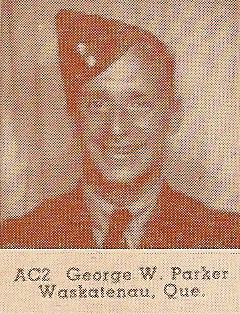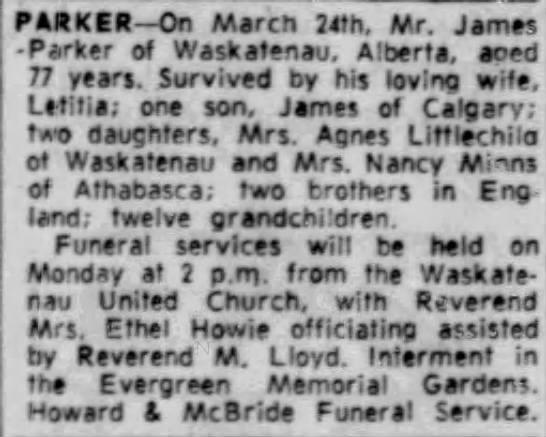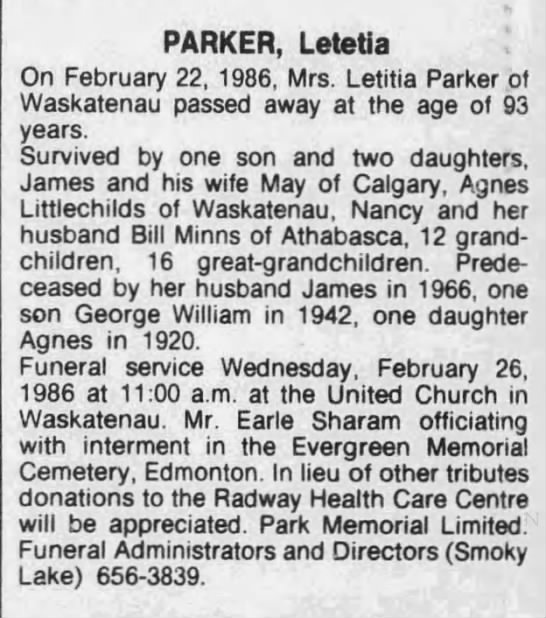


August 15, 1914 - October 14, 1942



George William Parker, born in Ashington, Northumberland, England, was the son of James (1889-1966) and Letitia (nee Biggs) Parker (d. 1986), Hollow Lake, 20 kilometres north of Waskatenau, Alberta. He had one brother, James (1912-1991), who had enlisted with the RCAF and was overseas by 1943. He also had two sisters, Agnes (1920-2006) and Nancy (b. 1933). The family moved to Alberta when George was 14 years old (1928). The family attended the Church of England.
George was farming at the time of his enlistment for ground duties in April 1942, living at the family farm. He enjoyed hunting, fishing, playing horseshoes and liked working on old gas engines to make them work.
He was 27 when he enlisted, standing 5’ 4½” tall, weighing 121 pounds. He had brown hair and dark brown hair, with a medium complexion. His fourth toe on his right foot was amputated in 1929 where he was hospitalized for one week, with no complications. “The RCAF will likely clean this fellow up.”
George was sent to No. 1 Manning Depot, Toronto April 4, 1942 until May 22, 1942. He then went to St. Thomas, Ontario, TTS until October 1942 when he was posted to Gander, Newfoundland. He was a guard for about a week, then became an electrician.
George had 25 War Savings Certificates with 23 of them in his mother’s name. His mother was the sole beneficiary to his estate.
George was en route to his posting at Gander, Newfoundland, aboard the SS Caribou.
The night of October 14, 1942 was very dark with no moon. Sixty kilometres off the coast of Newfoundland, the SS Caribou on her starboard side was torpedoed by German U-boat U-106. On board were 73 civilians including eleven children, 118 military personnel, and a crew of 46. The passengers were thrown from their bunks, several lifeboats and rafts were destroyed or could not be launched, as the ship sunk quickly, reports stating three minutes. Many passengers were forced to jump overboard. Over 135 people perished. Fifteen of the crew survived, many of them local men from the Channel/Port aux Basque area.
Two of the survivors who had suffered from shock and exposure due to the sinking of the SS Caribou, Aircraftmen Frank Earl Burton, 19, and Frederick Anthon Langley, 23, both airframe mechanics posted to Botwood, Newfoundland, perished in the fire at the Knights of Columbus hostel in St. John’s, Newfoundland, December 12, 1942. Ninety-nine people were killed, with 80 of them military personnel. Critically wounded: 109.
Mr. and Mrs. Parker were asked not to share the information from the telegram they received until an official announcement was made through the press.
In January 1948, a memorial was erected at Port-aux-Basques, Newfoundland, in memory of those who died in the torpedoing of the S. S. Caribou.
The Parkers received a letter dated October 24, 1955 from W/C Gunn informing them that George’s name would appear on the Ottawa Memorial as he has no known grave.
Please note on his photo, Waskatenau was mistakenly noted as being in Quebec, when it is in central Alberta, 90 km north east of Edmonton.
For additional information, please click on the links below.
LINKS: